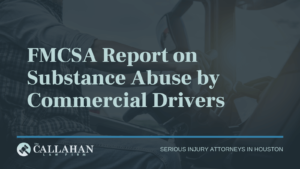FMCSA Report on Substance Abuse by Commercial Drivers

A new Drug & Alcohol Clearinghouse is an important tool designed to keep highways safer
The Federal Motor Carrier Safety Administration (FMCSA), which is part of the U.S. Department of Transportation (DOT), finalized the rollout of its Drug & Alcohol Clearinghouse in January of 2020. According to the FMCSA, the purpose of the effort is to improve highway safety by measuring drug & alcohol usage for holders of commercial driver’s licenses (CDL) and to give law enforcement, employers and other authorities the information they need regarding CDL holders’ drug and alcohol usage.
Prior to the FMCSA mandate for compulsory testing and reporting, the Department of Transportation required drivers to test only after an accident. Some driver-staffing companies would go above and beyond DOT rules and test commercial driver’s license holders as a condition of ongoing employment. However, there was no industry-wide rule, nor was there a central clearinghouse to track and report the data. The FMCSA’s new program has standardized testing and reporting and, within just a few months, has shed light on a troubling problem within the trucking industry.
By the Numbers: Truckers Testing Positive
A CDL driver is now required to undergo drug testing prior to beginning employment, as well as randomly each year of their employment. Over the first 5 months of 2020, the report has revealed that approximately 2.3% of truck drivers tested had either drugs or alcohol in their system when sampled. Thus far, only 1 million of the approximately 3.9 million CDL holders in the U.S. have undergone testing.
According to the report, positive drug tests accounted for 80% of the total violations reported. The bar graph below further breaks down the data by substance, revealing that marijuana, cocaine, methamphetamine and amphetamines are the most commonly used drugs among commercial driver’s license holders.

United States, the Federal government still recognizes it as a Schedule I drug. As the trucking industry is regulated by the Federal Department of Transportation, truckers are required to keep the drug out of their system, meaning that usage of marijuana is in violation of rules governing the trucking industry.
Skirting the System
The Clearinghouse only accepts results from urine tests. However, the Trucking Alliance, which is an industry-based safety coalition, recently published a study that paired drug and urine tests of 151,662 truck driver applicants. The study found that 0.6% of applicants failed the urine test while 8.5% either failed or refused to submit to a hair test. Given that the DOT considers refusal to take a drug test as a failure, the hair test failure rate was over 14 times greater than that of urine. A follow-up study demonstrated that based on the sample size of the paired study projects, with a 99% level of confidence and less than a 1% margin of error, over 300,000 truck drivers currently on the road would fail a hair analysis test for drugs.
The evidence suggests that, although the Clearinghouse initiative is a step in the right direction, it is likely that tens of thousands of CDL holders will avoid detection of drug use with the current system.
Commercial Trucking Accidents involving Drugs or Alcohol
Although drugs or alcohol are not the leading cause of commercial trucking accidents, they are one of the most avoidable. According to the FMCSA, over-the-counter drug use was an associated factor in 17% of large truck crashes, while illicit drugs and alcohol represented over 3% of trucking accidents. A combined associated factor of 20% is both troubling and avoidable.
What to Do if Involved in a Trucking Accident?
For anyone involved in a trucking accident, it is critical to determine the underlying cause, and often causes, of the crash. As the data above suggests, it is entirely possible that either drugs or alcohol may have been involved. Retaining an attorney who is experienced in representing people harmed as a result of truck crashes is essential to ensuring your rights are protected and justice will be obtained. If you or a loved one have been injured in a trucking accident, contact The Callahan Law Firm today for a free consultation.
Contact The Callahan Law Firm Today For A Free Consultation

Michael S Callahan is an attorney and founder of The Callahan Law Firm. He focuses his practice on representing individuals and families in personal injury cases involving motor vehicle and truck accidents, workplace accidents and defective products. With over 25 years of experience, he is dedicated to fighting on behalf of people whose lives have been forever altered by the negligence and carelessness of corporations and individuals. Originally trained as a mechanical engineer, Michael has been practicing law and fighting for justice for those who need it most since 1994. He is board-certified in Personal Injury Trial Law by the Texas Board of Legal Specialization and a member of various esteemed legal associations. Outside of work, Michael enjoys spending quality time with his family, outdoor activities, and continually striving to improve as a trial lawyer and human being.











